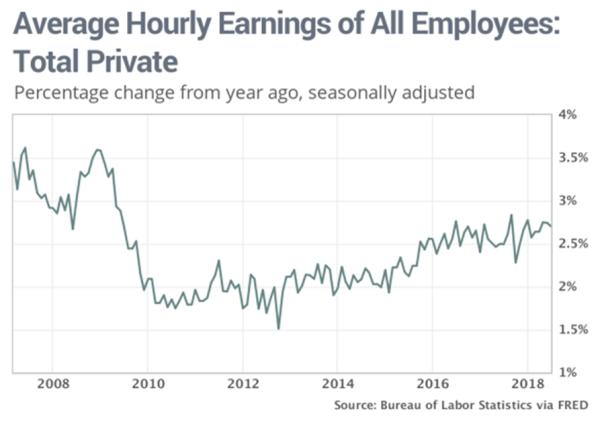Google “labor shortage” or “wage hikes” and the result is a picture of an overheating economy. Some examples from August 10:
911 Emergency: Call Centers Can’t Find Workers
Why Disneyland’s $15-an-hour labor deal is a win for workers everywhere
Colorado small businesses seek help with labor shortage
Washington growers struggle with labor shortage
Now hiring: teenagers (and anyone else willing to work)
Construction Labor Shortage Creates Increasingly Lucrative Career Paths
Jobs Go Unfilled as the Economy Expands
You can’t read these headlines and not expect wages to climb dramatically as desperate companies pay what they have to in order to keep their customers happy. But the macro numbers tell a different story. Here’s the change in average hourly earnings over the past decade:
Wages are clearly rising, but are 1) still way below the growth rate that prevailed heading into the Great Recession and 2) barely exceeding inflation, which means real wages aren’t rising at all.
How to reconcile wide-spread anecdotal labor shortages with slow to non-existent wage growth? Some possibilities, drawn from a recent MarketWatch analysis:
- Older and higher paid baby boomers who retire are being replaced by younger workers who start out earning much less.
- About half of all new jobs are being created in lower-paying fields such as package delivery, restaurants and social services. That is, the least educated workers are landing most of the new jobs, and are being paid commensurately, pulling down the average.
- Companies still lack pricing power, in part because of foreign competition. If they can’t raise prices, raising wages mean sacrificing profit, which is never the first choice.
The implication? This expansion may have a little longer to run, since wage hikes aren’t yet sharp enough to spur the Fed to aggressive tightening. But eventually all those labor shortage data points will coalesce into an inflationary picture, as employers discover that their choice is between lower margins and extinction.
At that point the Disney article you might have noticed above – in which the company granted 30% increases to a broad cross-section of employees – will become the norm rather than the exception, and wage inflation will start driving the discussion. Here’s an excerpt from that article:
Can the Magic Kingdom spread its fairy dust on America’s meager wage hikes?
Disneyland and key unions just agreed to an eye-catching contract for roughly a third of its 30,000-plus workers that will bump pay for the lowest-paid workers by as much as one-third — yes, 30-percent-plus — to $15-an-hour by January. That’s three years before the state’s escalating minimum wage hits that mark.
Organized labor’s high-pressure public relations battle with the theme park operator — no less, the realities of an ultra-tight labor market — convinced Walt Disney Co. to make a bold statement against what’s seemingly been long-running, conventional boardroom thinking: significant pay raises for the worker bee are history.
The added significance of this stunning pay hike in an economic era featuring remarkable corporate penny-pinching is that this involves a closely-watched corporate icon that has been a managerial trendsetter.
Workers everywhere — from other unions to individual employees to other Disney employees — should feel empowered to nudge bosses on pay. And if the request is denied, those workers may find a better-paying job elsewhere.
Disneyland may not want to be seen as endorsing $15 as a workable pay floor — but this contract will hit that magic level three years before the state’s mandate.
This Disneyland contract could be the forerunner of more significant pay across the tourism field.



3 thoughts on "Why Aren’t Widespread Labor Shortages Translating Into Roaring Wage Inflation?"
US economic policy in a nutshell.
1) Export jobs.
2) Import people to make up for lost economic activity.
We run Keynesian monetary policy coupled with a Keynesian immigration policy. More More More!
What rapidly growing export/manufacturing/resource industry does the USA have that needs a million extra workers each year? The whole thing is a scam designed to keep real estate artificially elevated. When robots start replacing workers by the millions it won’t be safe to go outside.
p.s. UBI won’t fix this because #math and #humanpsychology. The same reasons that Communism failed.
John you can’t fool your readers with that headline! 🙂
We all know unemployment is 21+%.
I agree. The reason there is no wage inflation is because there really aren’t that many good jobs out there. The job numbers and price inflation reports are the biggest government lies.